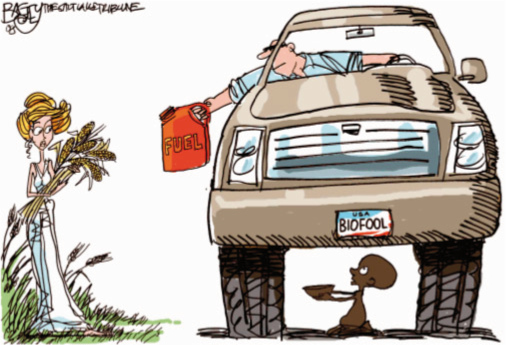Problems
The analysis so far suggests that the right sort of biofuel could yield a significant reduction in CO2 emissions from transport vehicles. However, since around 2007 there have been serious criticisms of biofuels in terms of:
- diversion of productive land from growing food
- destruction of rainforest for palm oil production
- rich firms driving poor people off their land to convert it to fuel crops (Figure 12).
An example of such criticism is the online BBC News report 'Will biofuel leave the poor hungry?' (Ayre, 2007).

In January 2008 the EU announced that they were rethinking their biofuel programme due to environmental and social concerns, and new guidelines were issued to ensure that EU targets are not damaging. At the same time, the UK House of Commons Environmental Audit Committee raised similar concerns and called for a moratorium on biofuel targets. In 2009 the UK Renewable Transport Fuels Obligation target for 2010/11 was cut from 5% to 3.5%, although it is still aiming for 5% by 2013 (Renewable Fuels Agency, 2009).
A 2011 Nuffield Report (Nuffield Council on Bioethics, 2011, p. xxv) advocated the potential benefits of biofuels, but recommended that they should be subject to a certification scheme to ensure that biofuels:
- are not produced at the expense of human rights
- are environmentally sustainable
- contribute to an overall reduction of greenhouse gases (as you have seen, some currently increase greenhouse gases)
- adhere to fair trade principles
- have costs and benefits that can be distributed in an equitable way.
